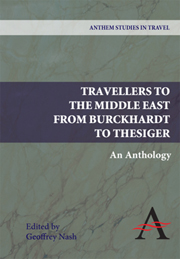Book contents
- Frontmatter
- Contents
- Acknowledgements
- Introduction
- PART ONE THE COMING OF EMPIRE 1800–1879
- The Ottoman Empire and Egypt
- Arabia
- 1 Travels in Arabia
- 2 Travels in Arabia
- 3 Personal Narrative of a Pilgrimage to Al-Madinah and Meccah
- 4 Narrative of a Year's Journey Through Central and Eastern Arabia
- 5 A Pilgrimage to Nejd
- 6 Travels in Arabia Deserta
- Persia
- PART TWO COLONIALISM AND RESISTANCE 1880–1950
- Bibliography
3 - Personal Narrative of a Pilgrimage to Al-Madinah and Meccah
from Arabia
Published online by Cambridge University Press: 05 March 2012
- Frontmatter
- Contents
- Acknowledgements
- Introduction
- PART ONE THE COMING OF EMPIRE 1800–1879
- The Ottoman Empire and Egypt
- Arabia
- 1 Travels in Arabia
- 2 Travels in Arabia
- 3 Personal Narrative of a Pilgrimage to Al-Madinah and Meccah
- 4 Narrative of a Year's Journey Through Central and Eastern Arabia
- 5 A Pilgrimage to Nejd
- 6 Travels in Arabia Deserta
- Persia
- PART TWO COLONIALISM AND RESISTANCE 1880–1950
- Bibliography
Summary
Burton's writings disclose his exceptional linguistic talents, deep knowledge of Islamic belief and practice, and a scientific accuracy worthy of the professional anthropologist and ethnographer. By temperament and upbringing – he spent much of his youth on the European continent – he was an outsider. Travel for him as for other Victorian explorers proffered the opportunity of escape from modern civilization and search for the primitive. He joined the East India Army in 1842, but upset his superiors by his reports, including one on the homosexual brothels of Sind. Sponsored by the Royal Geographical Society in April 1853 he embarked for Cairo on P.O. steamer Bengal disguised as a Persian, but changed his disguise in Egypt to that of an Afghan doctor, Mirza Abdullah. His account of his visit to the Muslim holy places, Personal Narrative of a Pilgrimage to El-Medinah and Mecca, was published in 1855. Burton was among the few modern Europeans to visit Mecca – before him the most notable were Ali Bey (Badia-y-Leblich) in 1807 and Burckhardt in 1814. He made much of the danger involved for a non-Muslim and the success of his disguise. Among his many later journeys the most celebrated was his exploration of the East African lakes with John Speke who without Burton discovered the source of the Nile. Like Palgrave, Burton's later career was spent in the diplomatic service. The only time he was able to employ his expertise in Arabic and Islamic studies, a period as consul in Damascus, 1869–71, nevertheless turned out a disaster.
- Type
- Chapter
- Information
- Travellers to the Middle EastAn Anthology, pp. 58 - 64Publisher: Anthem PressPrint publication year: 2009



